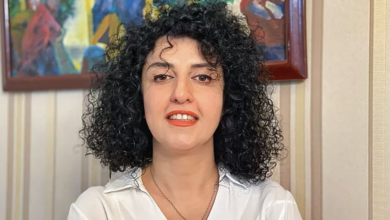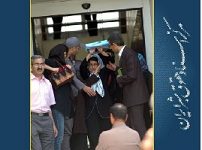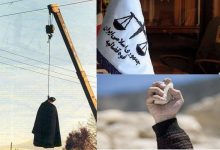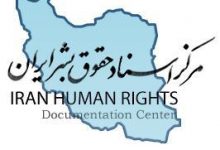An Analysis of the Responses Given by the Iranian Delegation to the Human Rights Committee
An Analysis of the Responses Given by the Iranian Delegation
to the Human Rights Committee
By Mohammad H. Nayyeri
Attorney at Law, Iranian Bar Association
LLB, LLM, PhD Candidate, Tehran, Iran
LLM Human Rights, London, UK
In 2009, the Islamic Republic of Iran (IRI) submitted its “Third Periodic Report” (CCPR/C/IRN/3) to the United Nations Human Rights Committee. On May 17, 2011 The United Nations Human Rights Committee presented the Islamic Republic of Iran with its “List of Issues regarding the Third Periodic Report of the Islamic Republic of Iran” (CCPR/C/IRN/Q/3). On September 12, 2011 the IRI submitted its response (CCPR/C/IRN/Q/3/Add.1) to the Committee. This analysis examines the response by the IRI.
Commissioned by:
Iran Human Rights Documentation Center
129 Church Street
Suite 304
New Haven, CT 06510
USA
In its third report to the UN Human Rights Committee, after 18 years of lack of cooperation, the Islamic Republic of Iran (IRI) replied to the questions of the Committee on its obligations under the International Covenant on Civil and Political Rights (ICCPR). These responses were examined by the experts of the Committee in the sessions held on 17-18 October 2011. During the sessions, the 18 member team of delegates from the IRI, in face-to-face discussions with the experts of the Committee, tried to complete their mission. In this essay I will analyse the written and oral responses given by the delegation of the IRI to the Committee. It should be observed that I could rarely find a question that received a proper answer. In analysing the responses, however, I will try to distinguish the techniques used by the IRI delegation to answer, or, I should say, to escape from answering, the questions. I hope this analysis will be helpful for the experts of the Committee and other UN mandate holders working on the situation of human rights in Iran.
1. Denial
What strikes at first glance, is the fact that the IRI delegation denied many obvious cases of violations of human rights. For example it denied any kind of discrimination on the basis of gender and religion. It, accordingly, alleged that all minorities, including Baha’is and Sufis, enjoy all rights equally. It denied torture and extrajudicial arrests and detentions. When it came to homosexuals, the denial reached its highest level. The IRI delegation alleged that speaking about human rights of homosexuals is “beyond the mandate and subject matter of the Covenant! It implicitly denied that homosexuals enjoy the rights protected in the ICCPR. This was reminiscent of the infamous 2007 statement by Mahmoud Ahmadinejad who, when speaking at Columbia University in New York, denied the existence of homosexuality in Iran.
2. Not Answering
The IRI delegation intentionally ignored some questions. While it allocated large parts of its response to quotes of regulations and unadopted Bills, the delegation, for example, gave no official statistic for the use of the death penalty and failed to respond to questions about public executions and stoning. It was only after insistence of the experts of the Committee that the delegation agreed to provide complementary statistics and figures during the extra time. Such information is unlikely to be provided, and, if so, it is unlikely to provide all the information requested. In another case, when the freedom of religion and apostasy were discussed, the delegation refused to speak about those converted from Islam!
3. Logical Fallacy
Another technique, which was used frequently by the IRI delegation to avoid answering, was logical fallacy through diverting the debate and distracting attention to instances outside the question. It sometimes took the form of narrowing a wide notion or event to a single aspect and extending the aspect to the whole issue. The following examples may help explain the vast deployment of this distraction technique in responses provided by the IRI delegation:
(a) Post-election events and the case of Kahrizak: When the delegation was questioned about violent suppression of protests after the controversial 2009 election, it ignored all cases of violations of human rights, killing people in streets, extrajudicial detentions, tortures, etc, and, in response, narrowed it to one case. Limiting all the happenings only to the case of infamous detention centre of Kahrizak, a delegate mentioned that the responsible people had been prosecuted and three people were sentenced to death. However, this case was only a small part of the shocking violations of human rights, and only resulted in prosecution and convictions of some lower-down people. The delegation, deliberately and with malicious intent, tried to confine the post-election events to the case of Kahrizak, which is clearly unacceptable.
(b) Intervention of lawyers and burglary cases: When the delegation was asked about the prevention of lawyers from intervening in political and security-related cases, an IRI delegate asserted that lawyers are free to accept and intervene in all cases such as burglary! He continued and gave a speech on the rights and freedoms of lawyers in defending their clients who are accused of burglary. Simply put, the IRI delegation, escaped from answering the question about the prevention of lawyers from playing their critical role in political cases, and tried to narrow the discussion to regular civil and criminal cases which were not the subjects of the question.
(c) Filtering of the Internet and pornography: In its response to the question about censorship and violating of the freedom of speech and filtering political opposition websites on the Internet, the IRI delegation diverted the debate to pornography and justified its actions in the best interest of families!
(d) Deprivation from education and ignoring the regulations of universities: Confronting questions about the prevention of some students from entering universities on the basis of their religious or political backgrounds, the IRI delegation explained that some students may be expelled because they ignore the regulations of the university or disrupt classes!
(e) Discrimination against Baha’is and ownership of factories: When the IRI delegation came across the issue of discrimination against Baha’is, it asserted that they are rich people and have factories, so they enjoy equal rights and there is no discrimination against them!
(f) Ethnicity and terrorism: When the IRI delegation was giving a response on the issue of repression and discrimination against ethnic minorities such as Kurds and Baluchs, the debate was diverted to terrorism. The IRI delegate stressed that they would not tolerate terrorism and bombing by ethnic groups!
(g) Security crimes and terrorism: In one case, the IRI delegate, after being questioned about the ambiguity of the security crimes, spoke about the crimes against national security and equalised them with espionage and terrorism. To the contrary, the notion of “crime against national security” is so generously extended that it covers all civil, political, and economic actions as well. Unlimited actions can be regarded as crimes against national security.
(h) Discrimination against Sunnis and azaan: When the IRI delegation was questioned about discrimination against Sunnis and the fact that they are not permitted to perform their religious traditions such as Friday Prayer and have a mosque in Tehran, the response was that Sunnis have their own azaan (Islamic call to payer) and local traditions. But the fact that remained unaddressed is that these Islamic Sunni traditions are only permitted in some Sunni cities and not in Tehran. In addition, having their own azaan does not mean that there is no discrimination against Sunnis.
(i) Education in minority languages and using local languages in classes: In its response to a question about deprivation of minorities from teaching their own languages, the IRI delegation asserted that minority teachers use their own language in the classes! It should be observed that the formal language of education in Iran is Farsi and speaking local languages in classes is certainly not equal to teaching their own languages. In fact, Iranian minorities are not permitted to have their own educational books to teach their own languages and all of their children have to study Farsi with the books written in Farsi. Accordingly, teachers use their own language to teach Farsi language. What else can they do?
4. Exaggerating
The IRI delegation, when explaining some issues, clearly exaggerated. Misusing the words “very rare” and “very difficult,” it unsuccessfully tried to pretend the high number of Hudud and Qisas punishments are very low. On the other hand, usage of the words “easily” and “very easy” for the following issues by the IRI delegation was nothing more than an unacceptable exaggeration:
(a) Girls going to court to ask for permission of marriage when a father does not permit his girl to marry; and,
(b) Women requesting a divorce according to the conditions stipulated in the contract of marriage or on the basis of “difficulty and hardship” (osr-o-haraj).
Similarly, when it spoke about “outstanding number of women human rights activists in the domestic and international arena” not only was it exaggerating, but also, it ignored those real and non-governmental women human rights activists who spend months and years in prisons only because of their human rights activities.
5. Selective Highlighting and Telling Part of the Truth
In order to show progress, the IRI delegation sometimes highlighted a period or an aspect without mentioning the whole period or all the aspects. For example, the delegation in its written response mentioned that “in comparison between the first and the eighth term of parliamentary elections, the number of women candidates and women elected have been doubled”. But, comparison between 5th, 6th, 7th and 8th terms with, respectively, 14, 13, 13 and 8 women MPs, clearly shows that the number of women MPs not only has not doubled but, on the contrary, has significantly decreased! Moreover, only 64 women (in fact 45 women when re-elections are considered) out of 2400 MPs of eight terms of the Parliament have been elected as MPs. This not a figure that a State can be proud of.
In addition, in some cases the IRI delegation intentionally told incomplete stories. It only spoke about those parts of the issues that it assumed showed its commitment to human rights. For example, when the delegation was proudly speaking about Article 168 of the Constitution which stipulates that “political and press crimes will be tried openly and in the presence of a jury” it knowingly did not state that, because the Parliament has refused or the Guardian Council has objected to define “political crimes” over the past 30 years, this article of the Constitution has never been enforced for political crimes.
Similarly, the delegation responded that “Revolutionary Courts do not follow special laws but the laws and regulations of the Penal Procedure Code.” It is true that Revolutionary Courts no longer follow their own separate rules; but, in the absence of rule of law, they ignore whatever parts of the law they want. One simple example is their refusal to give copies of verdicts to convicts and their defence lawyers, although that is specified in the Penal Procedure Code. Moreover, even in general laws such as Penal Procedure Code, there are special rules designed for Revolutionary Courts. They are special courts with special rules.
6. Lying
The responses provided by the IRI delegation sometime could not be interpreted as anything other than lies. In fact, the delegation had no commitment to truthfulness. They lied in a number of cases, some examples of which I provide here:
(a) Prohibition of polygamy: The IRI delegation, when asked about polygamy, responded “[b]y virtue of [a]rticle 16 of the Family Protection Law and article 645 of the Islamic Penal Code, polygamy is prohibited in the Islamic Republic of Iran, but could take place under particular conditions, including insanity of the woman, conviction to prison, infertility.” It is a lie! First, article 645 of the Islamic Penal Code has nothing to do with polygamy. It deals with and criminalizes marriage and divorce without registration. Second, article 17 of the Family Protection Law (1974), which used to criminalize polygamy, was declared against Shari’a by Guardian Council in 1984. Therefore Article 16 of the same law was abandoned and has no legal effect anymore. Since then, polygamy is neither a crime nor prohibited. To the contrary, according to the Civil Code, it is permitted and men do not need to prove “particular conditions” to remarry (i.e. permanent marriage) up to four times. There is no limitation to the number of temporary marriages at the same time.
(b) Gender equality in blood money: It was shocking that a delegate asserted that “there was a time that we did not have gender equality in blood money (diya) and now we have”! There has been never ever gender equality in blood money in the Islamic Penal Code. It was a big lie that I will come back to later.
(c) Appeal for drug-related convictions: Asserting the right to appeal for all cases including “drug related crimes” was another obvious lie which contradicts the text of Anti Narcotic Law (art. 32). I will come back to it again when I discuss the language game.
(d) Supervision of the judiciary of all detention centres and prisons: The IRI delegation, in its responses, asserted that “[i]n the Islamic Republic of Iran, all prisons are run and managed by the Prisons, Safeguarding and Educational Measures Organization, under the Judiciary.” The delegation later denied the existence of any prison or centre out of the control of the Judiciary. However, there are numerous detention centres under the exclusive control of intelligence and military forces. For example, inside Evin Prison, there are security sections including 2A (2 Alef), 209, 240 which are under exclusive control of the Revolutionary Guards and the Intelligence Services. Not only the judicial authorities but also special Committees of MPs for inspection of prisons (e.g. in 2005) were not allowed to enter these so-called “security” sections.
(e) No limitations on lawyers’ ability to be present at investigations: Although the discussion about the intervention of lawyers was long and its various aspects were debated by both experts and the IRI delegation, there were some instances when a delegate, probably under pressure, lied. For me, as a lawyer, it was unacceptable to hear from an official delegation that: “there is no limit to the presence of lawyers even in the first 24 hours of detention!” He even stressed that “the judge has broken the law he does not permit the lawyer to be present.” First of all, in the case of security crimes (which covers a wide range of crimes) defence lawyers are not allowed to be present during interrogations and they may meet their clients only after the bill of indictment is issued. It has also happened that lawyers and families are not informed about either the location of detention or the arresting organ (Police, Ministry of Intelligence, Revolutionary Guard, etc.) for weeks and months. Second, permitting lawyers to meet their clients and to have access to the dossier is in the exclusive discretion of the investigators and judges.
The IRI delegation in its written response confirmed that “according to the Clause of [a]rticle 128 of the Penal Procedure Code, in cases where confidential issues are involved or the presence of a non-accused person, at the discretion of the judge, may cause corruption, and also in offences against the security of the country, the defense lawyer may be present, at the stage of investigation, by permission of the examining judge.”This article is one of the basis for violations of the rights to defence and a fair trial. The judges and investigators of Revolutionary Courts label all cases either “confidential” or “security” and apply their discretionary power to not allow lawyers to be present at interrogations or even to read the dossiers. The so-called preliminary stage is subject to vast violations of human rights of accused people and, therefore, banning lawyers on the basis of security reasons leaves accused people defenceless in the hands of interrogators and security forces.
(f) Teaching minority languages in schools: The written response by the IRI delegation provided that: “members of other ethnic groups and non-Persian-speaking groups are not only free to speak their own languages, but can also release publications in their own languages and teach them in school.” Teaching minority languages in schools is a big lie!
7. Language game
The IRI delegation, in its responses, sometimes gave words meanings that differed from those intended in the Covenant or interpreted by the Committee experts. They also showed a tendency to change the internationally established definitions of words. In fact, their use of words took the form of a game in which the delegates knowingly used some specific words in their own believed or interpreted meanings. Put differently, they use their own language. As far as both parties were aware of the intended meanings it was acceptable. However, the delegation showed that they used this language game as a technique to mislead the Committee and to hide the reality. In order to make it clear, I will give some examples below:
(a) Religious minorities: When the IRI delegation talked about “religious minorities,” for instance when referring to recent amendments that considered equal blood money for religious minorities, it in fact referred to 3 recognised religions in the Constitution: Judaism, Christianity and Zoroastrianism. According to international human rights norms, the term “religious minorities” cover all religions and beliefs held by minority parts of the population. However, the IRI has limited the term “religious minorities” to the three above-mentioned religions and does not recognise the believers of other religions such as Buddhism, Baha’ism, Sufism, etc. as religious minorities. It is even worse when it comes to non-believers and atheists, and those converted from Islam as they are deemed criminals who deserve severe punishments.
(b) Women judges: The IRI’s response to the Committee included a table of statistics on “women judges.” In fact, the IRI had been questioned by the Committee about discrimination against women in the public sector, including judicial positions. The IRI, in its response, asserted that there is no discrimination against women in judicial positions. The table provided by the IRI, referred to 614 “women judges,” but despite its title, shows no woman in a position of “judge.” So-called women “judges” are not decision-making judges. You cannot find any women in real decision-making judicial positions such as presiding judge of a court. They just function as counsellors (counsellor judges in family courts) or prosecutors or administrative authorities. There are more than 1000 branches of Courts in Tehran; could the IRI delegation name only one branch in which its presiding judge is a woman? Even, women deputies of the judicial complexes only distribute and refer cases amongst the courts. Their complete title is Deputy of Reference. The Process of Choosing Judges Act (1981) stipulated that judges should be chosen among men and, women can be employed in counselling positions. This was because, a woman, according to Islamic law, cannot function as a judge, i.e. a sitting judge who issues verdicts. The reasons for this conviction, if freely discussed, will show the roots of discrimination against women in Islamic jurisprudence.
(c) Women can be elected as President?: According to Article 115 of the Constitution, “The President must be elected from among religious and political rejaal …”. The word rejaal (Arabic word; singular: rajol i.e. man) has raised some discussion. Some (majority) believe that it means “men” and for some it includes both men and women. Clearly, the language game is common even inside Iran. The IRI delegation, following the latter opinion and playing the same language game, asserted that article 115 includes both men and women, and there is no obstacle to the presidency of women. The delegation asserted in its written response that “the Guardian Council has not made any interpretation on the 115th principle of the Constitution.” However, the Spokesperson of the Guardian Council in 2004 declared that “the Council has not changed its interpretation of the Article 115 and women still may not be elected as President.”[1]
It should be observed that, by virtue of Article 98 of the Constitution, the interpretation of the Constitution is vested with the Guardian Council. Again, it is the Guardian Council that has authority to confirm the competence of candidates for Presidency (Art. 110(9) of the Constitution). In addition, the detailed records of discussions of the Experts of the Constitution leave no doubt about the interpretation of the word “rejaal” in Article 115. They (majority) explicitly were against the Presidency of women and excluded women by using the word “rejaal” and, in order to decrease the pressures, used an Arabic word to make it ambiguous. Until now, the Guardian Council has not confirmed any woman as a candidate for Presidency.
(d) Equal right to divorce: An IRI delegate when speaking about the “right to divorce” talked about an equal “right to file an application for divorce.” Of course men and women are equal in the right to file an application for divorce! Inequality is in the absolute right of men to divorce vis-à-vis limited predefined grounds on which women may request divorce.
(e) Domestic violence and safe houses: The IRI delegation, when faced with a question about criminalizing “domestic violence,” instead of accepting that there is no specific law relating to domestic violence, tried to equate it with other private crimes. The IRI, mentioning articles 619 and 622 of the Penal Code, which deal with crimes against pregnant women resulted in miscarriage (619), and crimes committed against women “in public places and streets” (622), showed that it has neither an idea about nor a plan for combating domestic violence.
Similarly, when the Committee experts asked the IRI delegation about “safe houses” for the victims of domestic violence, the delegation alleged that “we have safe houses”! However, looking at the definition and requirements of safe houses, for example, in Europe, one will realise that there are no such “safe houses” in Iran. There are only a very limited number of houses that are better referred to as “temporary accommodation for shelterless women.”
(f) Honour Killing: The IRI was questioned about article 630 of the Penal Code which exempts a husband from punishment for killing his wife and her lover in the event that he sees them engaged in sexual intercourse. The response of the IRI was that “[t]he Islamic Republic of Iran considers ‘honour killings’ as being disagreeable and forbidden.” Certainly, “honour killing” is a broad issue and does not fit into a single article. However, the Committee expected to receive a clear response to its question about article 630. In addition, while legal rules such as article 630 are still in force, no State can assert that it is intent upon battling the practice of honour killing.
(g) Most serious crimes: The IRI in its written responses, unbelievably, asserted that “[i]n the Islamic Republic of Iran, the punishment of execution has been stipulated only for the most serious crimes.” Human Rights Committee has singled out a number of crimes that do not meet the “standard of serious crimes” provided by Article 6(2) of the ICCPR: apostasy, homosexual acts, illicit sex, espionage, evasion of military responsibility, economic crimes, and political crimes. The case law of the Committee suggests that its interpretation of ‘most serious crimes’ is confined to murder, though, possibly, other violent crimes with grave consequences, such as aggravated forms of rape, are not excluded. So, apparently, the IRI, with a long list of capital offences, for example, even for economic and cyber crimes, wants to have its own definition of the term “the most serious crimes” and perhaps would like to share its genius(!) definition with the Committee, the monitoring body of the ICCPR!?
(h) Muharaba (also muharebeh): The IRI delegation asserted that the crime of muharaba had been misunderstood by the Committee and “it has nothing to do with war against God,” as usually translated. The IRI stressed that “moharebeh is considered an example of terrorist activities.” In order to analyze this assertion, I shall refer to the Islamic sources and explain the roots of the concept in Islamic law. The concept of “muharaba” has its roots in a Quranic verse (5:33) which calls for execution, crucifixion, cutting off of hands and feet alternatively or banishment for those who “wage war against God and his Messenger” and endeavor to do “corruption in the earth.” Looking at articles 190-196 of the Islamic Penal Code, which deal with the punishment of muharaba, one may find them in complete conformity with the above-mentioned Quranic verse.
However, in the definition of muharaba there are different views amongst Muslim jurists. According to the famous opinion in Shi’ite jurisprudence, which is copied in article 183 of Penal Code, any person who resorts to a weapon to cause terror and fear or deprivation of public security and freedom will be considered as a mohareb and corrupter on earth (mufsid fi-al-arz). In fact, the definition of muharaba has been generously extended and is open to further interpretation to include some crimes of a highly political character, such as membership of armed groups and supporting the overthrow of the Islamic regime. It has become a powerful lever in the regime’s hand to remove all opposition. In addition to the extension made to the law, the Revolutionary Courts have broadened the concept even further in practice. In the post-2009 election protests, Mohammad Amin Valian, a 20- year- old student, was sentenced to death by a lower Revolutionary Court for throwing three rocks during a protest.[2] In fact, the Court interpreted a rock as a weapon and concluded that he was muhareb!
(i) Right to appeal for all crimes: The IRI delegation asserted that verdicts for all crimes including drug related crimes could be “appealed.” However, according to article 233 of Penal Procedure Code, all appealable verdicts can be appealed in Appellate Courts of the same province. For those crimes with the legal punishments of death, stoning, amputation, imprisonment over 10 years, etc. the Supreme Court is the body for appeal. In fact the Supreme Court, in these cases, despite its defined formal (procedural) role and position, will play the role of Appellate Court and its trials are substantial. In sum, “appeal” is a substantial review of the case and the parties have the same rights as in the lower Court.
Now, let me have a look at the alleged “appeal” for drug related crimes. Drug related crimes are subject to a different procedure. They shall be tried in Revolutionary Courts with one judge and according to article 32 of the Anti Narcotics Law, only cases resulting in the death penalty require the approval of the Head of the Supreme Court or the Attorney General to be executed. In other cases (those not resulted in the death penalty) only the Head of the Supreme Court or the Attorney General, if they see a violation of law or Shari’a or lack of jurisdiction of the issuing Court, may reverse the verdict. So, there is no “appeal” stage for drug related crimes. In addition, notice that the Attorney General, who prosecutes criminals on behalf of society, shall approve the execution of verdicts as well! Seriously, is it an “appeal”?
[1] Link: http://www.jamejamonline.ir/newstext.aspx?newsnum=100004167229[2] Link: http://www.iranhumanrights.org/2010/05/student%E2%80%99s-death-sentence-for-throwing-rocks-reversed
8. Colouring a Crow and Selling it as a Canary
Using frequently the term “positive discrimination,” an IRI delegate tried to prove that, not only is there no discrimination against women in Iran, but also there are cases of “positive discrimination” in favour of them. To prove her assertion, she referred to the establishment of separate hospitals and universities only for women and banning men from studying gynaecology in all Iranian universities. Nevertheless, these actions are not based on the idea of positive discrimination in favour of women. By contrast, they are the results of the fundamentalist policy of gender segregation that views citizens as sexual lustful objects even in education and medical treatment. It is exactly this policy that created exclusive managerial positions for women in the ministries of Education and Medical Treatment, while it is not the same in other governmental bodies. The state policy to segregate male and female students even in graduate and postgraduate programmes of universities, as well as gender segregation of patients and doctors, instead of a positive discrimination in favour of women, is based on the Islamization of all aspects of social life. It also shows the tendency to see women from a sexual point of view and obviously insists on traditional prejudices which the Convention on the Elimination of All Forms of Discrimination against Women (CEDAW) is aimed at eliminating. The IRI is one of the few countries have not still ratified the CEDAW.
9. Promising the moon:
A significant part of the IRI responses to the questions were references and quotations from unadopted Bills such as the pending Bills to amend the Islamic Penal Code and the Penal Procedure Code. A closer analysis of these Bills and the process of their approval shows that the IRI is promising the moon! Below, I will have a look at the Bill to amend the Penal Code, which the IRI delegation frequently referred to as the solution to many problems.
Firstly, it should be remembered that the Bill to amend the Penal Code is still under review by Parliament, and that so far, the Guardian Council, in four stages, has announced total 214 incompatibilities[3] with Shari’a in the Bill, some of which cover more than one article. In fact some proposed progressive changes, have been objected to by the Guardian Council as incompatible with Islamic Shari’a and that they therefore should be changed by Parliament. It is to be remembered that, when the IRI speaks proudly about proposed positive changes in the Bill to amend the Penal Code (or other Bills) the Guardian Council and its actual and potential objections and disagreements must be considered.
Secondly, the human rights violations of the Bill of Penal Code are not less than the current Penal Code. The Bill repeats and keeps crimes such as muharaba and homosexuality, and brutal corporal punishments such as amputation, flogging, and crucifixion. The Bill also discriminates clearly on the basis of gender and religion. Still, explicit inequality of genders in blood money (diya) constitutes a specific article. Article 554 of the Bill provides that: “The blood money (diya) for murdering a woman is half of the blood money for a man.” In addition, the Bill, in contrast to the current Penal Code, explicitly recognizes apostasy as a crime punishable by death for men and by life imprisonment for women. It stipulates that, insulting the Prophet and his daughter and 12 Shi’ite Imams are capital crimes; and still discriminates against non-Muslims in more cases and with clearer words. Moreover, article 220, which allows the courts to refer to Islamic jurisprudence in cases where the Code is silent about some had punishments, clearly violates the principle of “no penalty without a law.”[4]This is the hidden key that will allow the continuance of brutal punishments such as stoning which is allegedly removed from the Bill. So, how can such a Bill be considered as progress towards a more humane and less discriminatory and violent law?
Thirdly, reading the 214 comments and objections of the Guardian Council to the Bill, one will realize that the ideal Penal Code in the eyes of Guardian Council is, if not the current Code in force, something harsher and in more conformity with Islamic jurisprudence (fiqh) and in particular Tahrir-al-Vasileh (the fiqh book written by Ayatollah Khomeini). Taking all the objections of the Guardian Council into account, the Bill may result in a harsher and more violent Code.
Fourthly, the IRI uses this Bill as well as the Bill of Criminal Procedure to reduce international pressure. It plays with the Bills to buy credit and time with some unlikely, if not impossible in the current regime, changes to show their movement toward more humane and modern laws. They themselves know well that most of these proposed amendments, regardless of the negative and backward changes, will never be approved by the Guardian Council as is evident now in the 214 objections. Let me say that the Bill that the Iranian delegates tried to pretend is the document showing their commitment to human rights and progress in amending their Penal Code, is nothing more than promising the moon and a red herring to distract attention.
Finally, the IRI delegation, knowingly, did not speak much or at all about other Bills such as the Bill to amend the Family Protection Law, the Bill on NGOs and the Bill to amend the Labour Law, which have raised extensive protests and criticisms among human rights defenders and activists. Moreover, the unknown Bill for removing the requirement of permission by the husband for his wife to travel abroad, which was referred to by a delegate, proved that the IRI delegation had no hesitation in making empty and unreal promises.
[3] Letters of January 9, 2009 with 27 objections, January 19, 2009 with 80 objections, November 22, 2010 with 98 objections, and March 20, 2011 with 9 objections.[4] Latin maxim: “nullum crimen, nulla poena sine praevia lege poenali”
Conclusion:
In my opinion, based on the above mentioned analysis the mission of the IRI delegation was not to “answer” the questions, but to play a game and close the file for a while. The IRI has shown that it does not believe in the aims behind human rights norms. Rather than implementing the spirit of human rights into its laws and practices, it only tries to escape from criticism. What is clear now is that the IRI does not make any change only on the basis of its international obligations. At the same time, it does its best to link all irrelevant or even accidental changes and reforms to the performance of its obligations. Moreover, making some superficial changes and using its exaggerated rhetoric, the IRI tries to pretend it has a deep commitment to human rights. However most of these changes and events, even if real, are only window dressing and have no depth. In addition, the hands of the IRI delegation are full of empty promises and it has no fear of lying in the face of the world. For them, shamefully, there was no red line for not lying and they showed no commitment to truthfulness. It is undeniable that the laws and practices of the IRI are in obvious contradiction with the ICCPR and other international human rights instruments. So, the IRI, rather than trying to hide and deny these contradictions, needs to listen and show a real intention to make change and progress.









